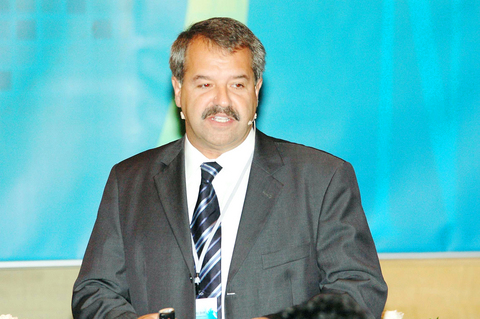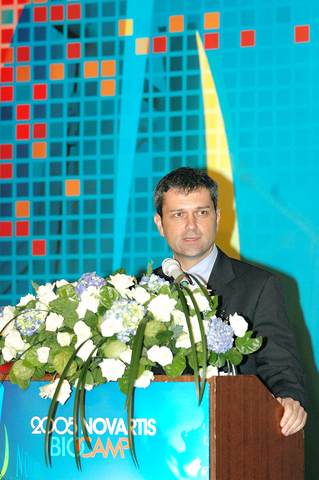In recent years, the National Health Insurance program (NHI) has faced mounting financial woes, leading to talk of increasing premiums and plans by the Bureau of National Health Insurance to exclude certain non-essential medication from NHI coverage.
In an exclusive interview with the Taipei Times, Fritz Britt, head of the Novartis Policy Office, Novartis AG, and Stefan Ziegler, Novartis Asia-Pacific regional head, talked about their thoughts on Taiwan's NHI system and how it compares with European health care systems.
Analyzing the cost distribution of the NHI, Britt said that he felt Taiwan was very "hospital heavy," meaning that the system favors the hospitals.

PHOTO COURTESY OF NOVARTIS
"Hospitals tend to be pretty expensive. In all the health systems I have seen, if you have [a scenario in which] you shift power to one of the players, then it's going to be more of a power game than a real balanced system. My experience of European systems is that you would rather have a balanced hospital and [clinic] system," Britt said.
According to Britt, 20 years ago in France the trend was the same, with hospitals tending to grow ever bigger. As a result, regulations were brought in to restrict hospitals to a certain growth rate. Britt said in comparison, hospitals in European countries such as France, Italy, Spain and Germany are far more closely controlled by the state, and subject to far more regulation.
"We don't want to jeopardize [clinics] because it's the [combination of hospitals and clinics] that makes treatment cost-efficient, and not [a health care system] in which the hospitals have a monopoly," Britt said.

PHOTO COURTESY OF NOVARTIS
Pointing to another "bucket" of costs, Britt talked about how Taiwan's NHI covers a broader range of services than other, more established systems in which services are more narrowly defined.
"Even in France or Italy -- the traditional total coverage systems -- they are now saying that [certain] treatments are privately paid for, that they are not covered by the reimbursement system. In the drug field, these are the over-the-counter drugs, the drugs for coughs colds, headaches -- the day-to-day types of drugs," Britt said. He went on to suggest that a good move for Taiwan would be to have some non-essential drugs being paid for "out of pocket."
"[Taking] these treatments out of the system means you free up money for the really costly interventions. This way you can really get rid of the financial pressure," Britt said.
Aside from regulatory changes, Britt and Zeigler emphasized the role which investment plays in cost containment.
"If you look around, the companies which survive are not only cutting costs, they are also investing in opportunities," Britt said.
By way of example, Britt pointed out that although advances in medical treatment and new types of drugs are expensive, they help to offset costs in other areas by reducing the length of hospital visits and keeping NHI members in the workforce.
"Innovation is probably the key to overall cost containment," he explained.
In Europe, where cost-cutting has been taken about as far as possible, efforts are being made to improve working methods and to use treatments and drugs that lead to shorter treatment loops.
Britt and Ziegler stressed that cost containment rather than cost-cutting was the goal, since with the increase in the number of diseases and the ageing population it was natural that the health system should grow -- preferably at a proportionate rate to the GDP.
According to Britt, in 2002 the percentage of health care expenditure as a percentage of GDP in Taiwan was 6 percent, which compares favourably to European countries where the figure is typically between 8-10 percent.
"The question is: 'What is the right proportion?' Most countries try to be between 8-10 percent of GDP," Britt said, explaining that where the proportion of health expenditure to GDP was higher than 10 percent, the health outcome wasn't necessarily visibly better.
However, in those countries where the figure is below 8 percent -- such as certain countries in Africa, Poland, or Hungary -- problems with the quality of health care result.
Ziegler explained that health expenditure as a percentage of GDP reflected things such as doctors per capita, hospital beds per capita and the time it takes to see a doctor.
"When you go below 8-10 percent of GDP it means you start to take infrastructure out of the system; you take a hospital out of the system, you take a [clinic] out of the system. When you decide [to do] this, you take that money and you put it somewhere else." Ziegler said, adding that such choices were conscious political decisions that affected the quality of health care.
Speaking about general recommendations for Taiwan's system, Britt said: "Taiwan needs a Taiwanese system. You can't copy another system -- there is no economically correct system."
Britt went on to explain that a system that worked in one country couldn't be guaranteed to work in another, since each has different starting points.
Britt referred to the Swiss health care system -- the only such system in Europe that is not bankrupt, according to Britt -- as an example. He said that a similar system couldn't be implemented elsewhere due to cultural differences and the fact that people would fight the changes.
Ziegler concluded by saying that what was important for Taiwan was that there should be a "vision" going forward.
"Say the vision 5-10 years down the road is a natural mix between private payments, private insurance systems, government insurance ? then you can work towards that."

The CIA has a message for Chinese government officials worried about their place in Chinese President Xi Jinping’s (習近平) government: Come work with us. The agency released two Mandarin-language videos on social media on Thursday inviting disgruntled officials to contact the CIA. The recruitment videos posted on YouTube and X racked up more than 5 million views combined in their first day. The outreach comes as CIA Director John Ratcliffe has vowed to boost the agency’s use of intelligence from human sources and its focus on China, which has recently targeted US officials with its own espionage operations. The videos are “aimed at

STEADFAST FRIEND: The bills encourage increased Taiwan-US engagement and address China’s distortion of UN Resolution 2758 to isolate Taiwan internationally The Presidential Office yesterday thanked the US House of Representatives for unanimously passing two Taiwan-related bills highlighting its solid support for Taiwan’s democracy and global participation, and for deepening bilateral relations. One of the bills, the Taiwan Assurance Implementation Act, requires the US Department of State to periodically review its guidelines for engagement with Taiwan, and report to the US Congress on the guidelines and plans to lift self-imposed limitations on US-Taiwan engagement. The other bill is the Taiwan International Solidarity Act, which clarifies that UN Resolution 2758 does not address the issue of the representation of Taiwan or its people in

US Indo-Pacific Commander Admiral Samuel Paparo on Friday expressed concern over the rate at which China is diversifying its military exercises, the Financial Times (FT) reported on Saturday. “The rates of change on the depth and breadth of their exercises is the one non-linear effect that I’ve seen in the last year that wakes me up at night or keeps me up at night,” Paparo was quoted by FT as saying while attending the annual Sedona Forum at the McCain Institute in Arizona. Paparo also expressed concern over the speed with which China was expanding its military. While the US

SHIFT: Taiwan’s better-than-expected first-quarter GDP and signs of weakness in the US have driven global capital back to emerging markets, the central bank head said The central bank yesterday blamed market speculation for the steep rise in the local currency, and urged exporters and financial institutions to stay calm and stop panic sell-offs to avoid hurting their own profitability. The nation’s top monetary policymaker said that it would step in, if necessary, to maintain order and stability in the foreign exchange market. The remarks came as the NT dollar yesterday closed up NT$0.919 to NT$30.145 against the US dollar in Taipei trading, after rising as high as NT$29.59 in intraday trading. The local currency has surged 5.85 percent against the greenback over the past two sessions, central